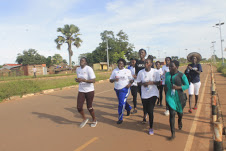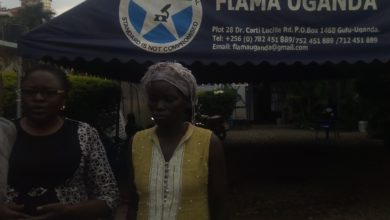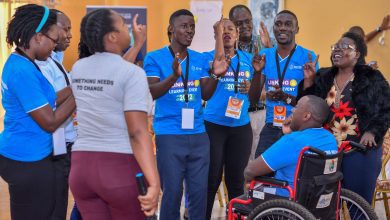The Aids Support Organization (TASO) remembered their founding members, Dr. Noerine Kaleeba and 15 other fallen heroes who were affected or infected by HIV/AIDS during a candle light ceremony held on May 17, 2024.
“We have 85 TASO aid drugs support centers across Northern Uganda for our clients to get their treatment.We came from far, we need to appreciate, this day is a special day. It is the day we need to remember our departed staff.
“We also need to remember the people who lost their dear loved ones,” said Dr. Anna Lawino, TASO project director.
GULU CITY-FRIDAY, MAY, 17, 2024
By Livingstone Okumu Langol
Dr. Anna Lawino, the Director of TASO, Northern Uganda based in Gulu City while officiating candle light in remembrance of the departed 180 workers to HIV revealed that TASO is supporting 42,000 clients in all the units of the Acholi Sub Region.
“We came from far, we need to appreciate today is a special day, we need to remember the people who departed from us.“We need to remember the people who lost their dear loved ones, they have left a legacy, you need to have spirits of compassion. “We know that we lost people, wand we have a duty to end HIV, but how do we do that?” Dr. Anna Lawino wondered.
She revealed that Uganda is having more than 10,000 children living with HIV, and added that they need to go the villages and have to count those children living with HIV.
According to prevalence findings, the majority of new infections are young girls and the older men.“We need to find those men if we are to fight HIV new infections, and the next move is to go the villages,” she said.
Walter Okema, Gulu TASO Center Manager HIV said if we are to meet the target of HIV-free Uganda by 2030 then there is need to fight against stigma, adding that TASO’s HIV services are free.
“We need to stop new infections. “If an infected person is taking his/her drugs correctly, it can reduce the rate of passing HIV to others. We also have prep that can prevent new infection and breast-feeding infection,” Mr. Okema Walter said.
He told the Northern Uganda Media Club (NUMEC) journalists that TASO Gulu Center, is almost 9,000 clients who are getting antiretroviral drugs from them.
“We also have other centers close to where our clients they live in nearby Health Center IIs and Health Center IIIs.“We sending messages for those may not be able come for the treatment, to reach them by phone contacts so that they can be assisted to access their drugs,” Okema said.
“The turn up for testing is not good, especially by men, they are hiding even if their spouses they are coming for treatment and testing,” Okema lamented.
He revealed that the HIV prevalence rate is 4 percent for those who report for voluntary testing. He told NUMEC that the main Uganda International Candle Light World Celebration Day was held in Homia City.
Mr. Walter Okema lamented that in the months of March and April alone up to 359 clients were not showing up to access their services but that they managed to trace and bring back 180 clients who had not been coming for their drugs.
“We are trying, we make phone calls to remind them that they have missed their treatment, we are committed to treat them” The Center Manager said.
He reveled that they also have their employees who pick the drugs and take them to the community, saying this helps to reach out to the clients in time.
Mr. Okema revealed that TASO faces challenges because the resources envelop is limited resources, they would have also liked to provide food rations to support some clients who do not have food.
“And there are some clients who abandon drugs, complaining about the bad taste, other complain about lack of transport to reach their contact points,” the manager said.
Other challenges include non-disclosure of HIV status, especially for those who enter new relationships, Okema said. “Other clients miss treatment because they do not carry them along when they move out of their homes for various reasons while others say they are tired of drugs,” Okema revealed, adding that this requires a lot of counselling services.
Testimony from HIV survivor
Mary Atim, a middle age TASO employee working with adolescents says they reach out to 850 of them in the region. She says the adolescents face challenges with stigma. She decries that there are some caregivers who do not support their children living with HIV.
“As parents they should have good heart, and good working relationship with the TASO social workers and also support their children,“ Atim emphasized the lack of parental or caregiving responsibilities.
“The challenges among them is poor monitoring of their children, they do not help their children to take their drugs as regularly and as timely as they should. “That is why we have some bad records of viral load among the children,” Atim said.
She decried the long distance they have to cover to reach out to their clients and also noted that some clients keep on changing their location, even transfer to a new place without giving them new contact addresses.
“Some children have bad attitudes towards taking HIV drugs because of side effects, and some adolescents do not disclose their status to their partners and therefore face challenges of taking their drugs regularly and timely,” Atim decried.




